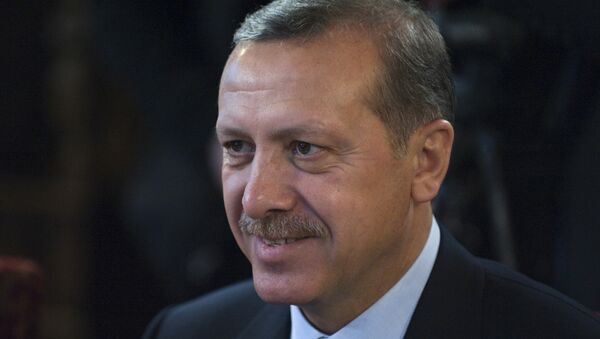MOSCOW, August 28 (RIA Novosti) - Recep Tayyip Erdogan was inaugurated Turkey's president on Thursday after winning the country's first direct election.
Erdogan was born on February 26, 1954, in Beyoglu, Istanbul’s suburb. His father, Ahmet Erdogan, was a member of the Turkish Coast Guard.
Erdogan graduated from the Kasimpasa Piyale primary school in 1965 and from the Istanbul Religious Vocational High School (Imam Hatip School) in 1973.
In 1981, he graduated from the Faculty of Economics and Administrative Sciences at Marmara University, and became an active member of the National Turkish Student Union. In 1976, he became head of a youth group of the Islamist National Salvation Party (MSP) and later the leader of the party’s youth branch in Beyoglu.
All political parties were banned in Turkey following a military coup on September 12, 1980, suspending Erdogan’s political career.
He worked for Istanbul transportation companies until 1980, when he lost his job. For the following few years, he worked as a consultant and manager for private companies. In 1982, he served in the army.
The Islamist Welfare Party was created in 1983, and Erdogan resumed his political career. In 1984, he became the head of the party’s Beyoglu branch, and in 1985, he was appointed head of the Istanbul branch and joined the party’s supreme council.
Erdogan ran for parliament in 1986 and 1991, losing both times.
In March 1994, he was elected mayor of Istanbul, becoming the youngest mayor in the city’s history.
In 1998, Erdogan received a criminal sentence for reciting an Islamist poem at a meeting of his supporters in December 1997 and had to resign from the mayor’s post. He was given a ten-month prison term, of which he served four months.
The Virtue Party soon took the place of the Welfare Party after it was banned in 1999. Erdogan headed its reformist faction. The Virtue Party was banned in July 2001, and the future prime minister of Turkey founded the Justice and Development Party (JDP, or AK Party, or AKP) and was elected its chairman. In November 2002, the party won a majority of seats in the parliament and with that, the right to form a government.
According to the Turkish constitution, candidates with a history of ideological crimes could not run for parliament. Therefore, Erdogan’s closest ally, Abdullah Gul, became head of AKP’s new government. The AKP-controlled parliament soon amended the constitution to lift the ban that prevented Erdogan from running for parliament. He was elected into the parliament at the rescheduled elections in Siirt and served as prime minister between March 2003 and July 2007.
Erdogan’s AK Party won the early parliamentary elections in July 2007, and he returned to being the chair of the government, which received a confidence vote in parliament on September 5, 2007.
During the next parliamentary elections, in June 2011, the AKP won about 50 percent of the vote, giving Erdogan the opportunity to form his third government.
On August 10, 2014, Prime Minister Recep Tayyip Erdogan, head of the ruling Justice and Development Party, participated in the first direct presidential election held since 1923.
He won in the first round, with 52 percent of the vote.
Erdogan visited Russia many times. He is Doctor Honoris Causa of the MGIMO University of Russia’s Foreign Ministry.
As a young man, Erdogan played football for several semiprofessional Istanbul clubs.
Erdogan and his wife Emine (born Emine Gulbaran on February 21, 1955) have four children: two sons, Ahmet Burak and Necmeddin Bilal, and two daughters, Esra and Sumeyye.


